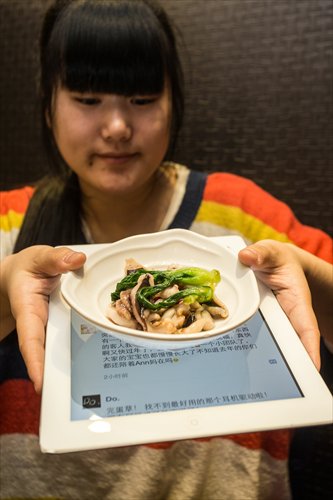Hungry moments
Homebodies can now order meals on WeChat, but concerns raised over lack of regulations

At present, people who order from WeChat catering services primarily rely on online word-of-mouth to judge whether a vendor's food is safe or not. Photo: Li Hao/GT
Each morning, 34-year-old Li Ting jostles her way through the bustling mobs at the fish market in Beijing's Chaoyang district to purchase fresh crayfish and crab.
The shellfish is transported to a cramped kitchen Li Ting has rented nearby. She washes the seafood under running water and vacuum-packs it for hygiene in preparation for cooking. Then, she awaits the orders to come in, via Chinese social media platform WeChat.
The WeChat profile for Li's catering service provides a simple menu with accompanying pictures and detailed descriptions of how the food is cooked.
They deliver to households within a 30-kilometer radius of the kitchen, and customers can order and pay directly through the social media platform.
"On a busy day, we'll get over 20 orders," said Li. "Compared to traditional restaurants, the advantage we have is that the operational costs are lower."
Perhaps an even bigger advantage is that operating on a social media platform like WeChat facilitates word-of-mouth, allowing such businesses to build a loyal customer base in a short period of time. Since launching in June, Li's catering service, Maxiaoxiong, has gained over 1,500 fans on its profile page.
Maxiaoxiong is one of thousands of WeChat "restaurants" that have popped up over the past year in China.
But while some of these businesses have been enthusiastically greeted by consumers, concerns are growing over the lack of regulations governing their operation.
In August, authorities in Wenzhou, Zhejiang Province tested 44 batches of food produced by various WeChat meal vendors around the city, finding that 25 of the batches fell below the national standard for safety and hygiene, according to the China News Service. Of these 25 batches, most had bacterial counts exceeding the level deemed safe for human consumption.
Despite the findings, Cui Lijin, secretary of the Zhejiang Provincial Consumer Protection Commission, said in the report that at present, little could be done to regulate such businesses.
"[All we can do is] to try to make sure consumers are well-informed about the risks," said Cui in the report.
Liao Zhen'gang, a lawyer with the Fucheng Law Firm in Beijing, provided further clarification.
"Theoretically speaking, if someone wants to sell food through WeChat, they need to get business license, a food safety production certificate, a hygiene permit and a worker's health certificate," said Liao.
"Only then are they permitted to make and sell food under the law."
The problem, said Liao, was that many WeChat food vendors operated illegally, without certificates or licenses, meaning that normal enforcement procedures could not be easily applied.
"Many users do not register their accounts using their real names. This makes it difficult for supervisory bodies to enforce regulations, because often, they do not know who these people are or how to find them."
If workers from regulatory bodies tried to contact them through the platform, said Liao, users would simply delete their account.

Crayfish from Maxiaoxiong. Photo: Courtesy of Li Ting
Consumers nonplussed
Li Hongze, a 28-year-old adman, has been a regular user of Li Ting's WeChat catering service since shortly after it opened.
"It was a hot summer's day, and I didn't want to eat out," said Li Hongze.
"I saw that [Li Ting's] store had a lot of 'likes,' so I decided to order two servings of crayfish."
Happy with the food and service he received, Li Hongze shared a link to the store's WeChat page with his group of friends on the social media platform. A number of his friends have since tried the service.
Asked whether he was worried about the safety of the food prepared by Li Ting in the wake of concerns raised by quality control experts and consumer advocacy groups, Li Hongze said that his fears were assuaged by meeting Li Ting in person, as well as becoming "friends" with her on WeChat.
Li Ting posts updates and photographs every now and then showing the entire process of how the food is acquired and prepared on the WeChat page for Maxiaoxiong, giving customers a feeling of transparency.
"I believe in their integrity and I'm not worried about the safety of their food at all," said Li Hongze.
Ding Yi, a 23-year-old who also works in an advertising company, also expressed confidence in the safety of the food she has ordered from another WeChat catering service, called Yijie Private Kitchen.
"Whether the food is good or not, you can taste it," said Ding.
"I often think that the spiced crayfish served in [regular] restaurants isn't safe," she said.
The fact that WeChat catering services were often run by a single person from home, said Ding, also gave her a sense of assurance as it meant that their individual reputation was at stake.
If there were any problems with the food, people would know immediately on WeChat, said Ding.



Raw ingredients, pigs trotter with soybeans, and dumplings from Yijie Private Kitchen. Photos: Courtesy of Yu Er
Self-regulation
Zhang Li (pseudonym), the woman behind Yijie Private Kitchen, refused to answer when asked whether her business had the certificates required to operate legally.
But she insisted that she was rigorous in the way she observed her own food safety standards, from the choice of ingredients to the cleanliness of her kitchen to the way the food was prepared. Anything she herself would not eat, said Zhang, she would not serve to her customers.
Zhang said that as the freshness of ingredients was important to her, Yijie Private Kitchen requires that customers order at least one day in advance of when they would like their meal. In this way, rather than storing raw ingredients for days or weeks on end, it is always bought fresh.
Consequently, the kitchen serves very few orders each day, making home-style "banquets" rather than convenient fast food fare.
"We usually make two tables of food each day, which includes lobster, abalone, crab, beef brisket and sausage," said Zhang.
All the ingredients she sources, said Zhang, are from nationally certified providers.
Li Ting on the other hand, said she had acquired a proper business license, a food circulation permit, an organization code certificate and a tax registration certificate before Maxiaoxiong was opened.
"It took almost one month and over 10,000 yuan ($1,618)," said Li Ting.
Regulation by public opinion
Liu Yaping, a professor at the Public Management School at Sun Yat-Sen University, said in an interview with the Southern Weekly that by operating on a social media platform, WeChat catering services were in a sense regulated by public opinion.
"[For this reason], some people don't care whether the [WeChat catering services] have official permits or not," said Liu. "They feel as if they understand the risks."
Given that WeChat restaurants are not subject to supervision or regular checks from health inspectors, Liu suggested in the report that if they wanted to further assure customers about the safety and quality of their food, vendors could allow customers to visit their kitchens, increasing transparency further.
"Consumers can also use online evaluation systems, such as dianping.com, to evaluate the safety of food served [by WeChat vendors] and to make the information public," said Liu Peng, associate professor at the Public Management School at Renmin University of China in comments to the Southern Weekly.
Li Ting said she is opening her kitchen up for public inspection at the end of the month, allowing customers to visit as well as to pick up food directly from the site.
"Customers won't be able to dine in," said Li Ting. "[But] we want clear any doubts about the sanitation of our kitchen, so they can come and see it for themselves."
Liao however, said that there was still a need for better regulation and enforcement of food safety standards on WeChat vendors.
He said the onus of enforcement should be placed on the social media platforms that host them, by prohibiting any vendors that do not have business licenses or hygiene permits.
At present, such laws apply to e-commerce websites such as Taobao, but not to WeChat, which traditionally has not been a platform for buying and selling.
"[WeChat] should be responsible for the preliminary checks on whether vendors and food sellers have the required certificates and licenses," said Liao.
"If they do not have the required business licenses or hygiene permits, they should not allow the stores to operate on its platform."